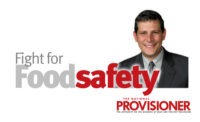Fight for Food Safety
Two-front war vs. allergens, pathogens must continue

I write frequently about the government stepping up its efforts to ensure food regulated by the USDA’s Food Safety and Inspection Service (FSIS) do not contain undeclared allergens. Some have labeled these efforts as the agency’s “Attack on Allergens.”
While the FSIS-regulated food industry has directed most of its limited food-safety resources over the last decade toward keeping harmful pathogens out of its food products, the existence of undeclared allergens has become a major issue. As I watch the meat industry begin to shift those limited resources away from the control of pathogens toward enhanced allergen control, I am fearful that food companies may once again expose their flanks to increased recalls for the presence of E. coli, Salmonella and Listeria monocytogenes in regulated products.
As noted, FSIS’ enhanced scrutiny on allergen control in federal establishments has led to a substantial increase in the numbers of recalls being announced for the presence of allergens not appropriately identified on the product’s label. The presence of undeclared allergens in FSIS-regulated products is now the leading cause of recalls.
Last year, of the 122 recalls announced for these products, nearly 50 were triggered because of undeclared allergens. And the trend continues. So far this year, there have been nearly 20 recalls for mislabeling or undeclared allergens involving over 1 million pounds of product.
But something else is happening as well. While the number of allergen-related recalls in recent years has been increasing, the number of pathogen-related recalls has been trending lower. Until now.
When one examines the most recent data, it looks as though there may be a slight increase in the number of recalls of food products being announced for harmful pathogens. So far this year, the presence of harmful pathogens in FSIS-regulated food products has been responsible for at least a half-dozen recalls involving more than 200,000 pounds of a wide range of FSIS-regulated boneless beef, veal, salad and pizza products. Given these signals, it might be said that the enemy is taking away some hard-fought terrain from industry on the battlefield of pathogen control.
So, the message of my column this month is that, while industry has made considerable progress in recent years keeping harmful bacteria out of the food supply, the war is far from over. And, despite industry’s incredible accomplishments to date, it cannot allow pathogens to regain a foothold in this struggle. Thus, as your company works to invest in stronger allergen controls, do not allow it to divert limited resources away from pathogen control. As your company prepares to defend against the agency’s Attack on Allergens, never forget the War on Pathogens must wage on. NP
Looking for a reprint of this article?
From high-res PDFs to custom plaques, order your copy today!






